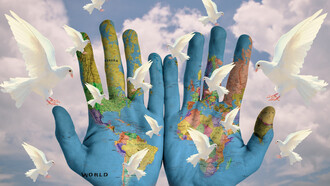It sounds like a slogan, and it is a slogan. Slogans are not necessarily meaningless; their advantage is that they appeal directly to people with a clear and understandable message. Making poverty illegal also means eradicating poverty once and for all.
Slogans are not useless either, because they can indeed point to concrete policies. It is clear that something must be done to solve the poverty problem. Despite all the global priorities and well-intentioned government anti-poverty programmes, poverty is not decreasing.
In the rich world we live in, poverty is completely unacceptable. In a world where the wealth of the richest consists of many deceptive zeros (100,000,000,000... US dollars), it points to the injustice in society.
In addition, although poverty programmes exist almost everywhere, there is still no real political will to truly eradicate poverty. Often, they are nothing more than an attempt to legitimise a government or policy, or in other cases to combat the most severe manifestations of poverty. Only rarely is there a desire to change social structures or truly emancipate people.
That is why anti-poverty policies are not always the right answer to existing poverty. After all, much more is needed than a handout. Anyone who really wants to eradicate poverty will want to prevent it. Because people are not born poor, they are made poor. A broad welfare state is therefore needed, with employment, good public services for healthcare, education and housing. With solid labour laws to protect working people from exploitation and accidents at work. And ultimately, if people really fall through the cracks, with benefits that are at least at the poverty line level.
One of the many problems in achieving this is that poor people may be organised, but they are not strong. They have little capacity to take action that can affect society, let alone the political world.
So far, policy has hardly been effective; there are just as many poor people in Africa today as there were in 1990. Only in a few rare countries is poverty really declining. Some people think that poverty is 'normal', that it has always existed and always will. There is little that can be done about it.
What is meant by the slogan 'make poverty illegal' is therefore this: enshrine this principle in the constitution as an objective for all governments, regardless of their ideological composition. It is not only a moral principle, but also a legal and rational point. Article 25 of the Universal Declaration of Human Rights and Article 11 of the Convention on Economic, Social and Cultural Rights state that everyone has the right to an adequate standard of living. Those living in poverty do not have this.
Although there are major ideological differences on poverty, there is a consensus that poverty must be combated. The political will to do so effectively may be lacking, but it should not be a problem to state the goal clearly and unambiguously.
Based on a human right, all movements have a tool they can use to effectively take up the fight. No matter how much criticism some in the South may have of the way in which human rights came about and were declared universal, no one doubts their usefulness. All indigenous peoples also use them to enforce their rights.
There is even more that can be done: cities and municipalities can take the initiative to declare their territory poverty-free. This is perfectly possible and achievable, with a local employment policy, a social and solidarity-based economy, adequate benefits, and open and transparent social services. It is primarily a matter of political choices that need to be made.
These are two steps that can effectively improve poverty reduction.
In this approach, it is important that poor people are given opportunities to really get ahead, and by that I mean that they can truly escape poverty and get back on their feet financially and economically.
Today, it is fashionable to take a multidimensional approach and argue that you can never shake off poverty. Once poor, always poor. You can earn an income, but you will forever live with the psychosocial consequences of the suffering you have endured.
That may be true, but it is not necessary to include these long-term consequences in the definition of poverty. Trauma and other psychological problems are not the monopoly of poor people, and it is absurd to continue to call people who have overcome income poverty 'poor'.
We do not refer to cancer as a 'multidimensional problem', even though this serious illness also causes many secondary problems. People with cancer need, first and foremost, good medical care. Those who are poor need, first and foremost, the means to become self-reliant. This could be a wage or a benefit, but also public services that are free or very low-cost.
The aim of poverty reduction must always be to enable people to live financially and economically autonomous lives. In short, to empower them.
That is why it is essential never to lose sight of the central issue of income. However many ‘dimensions’ poverty may have, it is essentially and ultimately an income problem. Until that is resolved, people will indeed remain at the bottom of the social ladder.
This point is particularly important today, now that the far right is gaining support in all our countries.
Those who argue that you can never completely shake off poverty are effectively saying that social mobility is impossible, that there are no bridges to a truly better life.
And that is also what the far right says: society is like an organism, with everyone in their fixed place with their own specific function. You are who you are, and you remain who you are. If you are at the bottom, you stay at the bottom.
This is therefore a dangerous line of reasoning that can permanently marginalise and exclude people, and not just the poor. It also confirms the great inequality in our society, another problem that must be tackled with fair taxation in order to eradicate poverty and inequality.
The far right and great inequality are not only dangerous for poor people, but also for democracy. It then becomes clear that a good social policy, for everyone, can become an essential tool in the fight for democracy and human rights.
Social justice is too often forgotten as an essential part of a stable democracy. The economy, which today determines almost all our thinking, needs it just as much.















